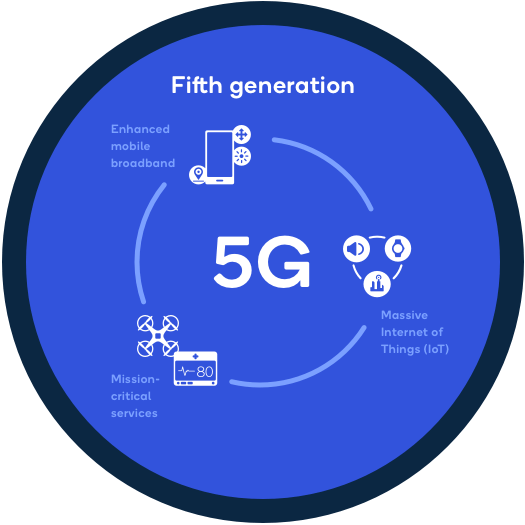With the rapid growth of technology, 5G has emerged as a revolutionary force in mobile technology and connectivity. This fifth generation of mobile networks is set to transform how we connect, communicate, and experience the digital world. Its introduction brings faster speeds, improved reliability, and seamless wireless connectivity, shaping the future of high-speed internet access and paving the way for innovative tech advancements.
What is 5G?
5G is the latest upgrade to mobile networks, designed to deliver faster data speeds, greater capacity, and lower latency compared to its predecessors (4G and 3G). It aims to connect devices more efficiently, allowing users to download, stream, and browse at unprecedented speeds. The real difference lies in howthese networks can handle more connections at once, enabling various industries to innovate using smart devices, the Internet of Things (IoT), and autonomous systems.
How Does 5G Work?
5G operates through high-frequency radio waves that allow data to travel at higher speeds. Unlike 4G, which relies on large cell towers, it uses smaller cell sites called “small cells” to transmit data more effectively. These small cells can be placed on streetlights, buildings, or other structures to provide better coverage.
The technology also uses multiple spectrum bands—low, mid, and high frequencies—to balance speed and coverage. Low-band provides widespread coverage, while mid-band delivers faster speeds, and high-band (also called millimeter waves) ensures ultra-fast data transmission. By combining these bands, it creates a more reliable and efficient network for users.
Key Benefits of 5G
1. High-Speed Internet
One of the biggest advantages of 5G is its high-speed internet. With speeds up to 100 times faster than 4G, it allows for quicker downloads, streaming in 4K, and real-time gaming with minimal lag. This improvement in speed not only enhances user experiences but also supports businesses that rely on rapid data transfer, such as video conferencing, virtual reality, and cloud computing.
2. Improved Wireless Connectivity
5G is designed to handle a large number of connected devices, making it ideal for areas with high device density, such as smart cities. Wireless connectivity becomes more seamless, reducing the chance of network congestion. Whether you’re in a crowded stadium or a busy urban area, 5G ensures a stable connection, enabling people to stay connected with minimal disruptions.
3. Reduced Latency
Latency refers to the delay between sending and receiving data. With 5G, latency is significantly reduced, often to less than one millisecond. This opens the door for real-time applications, such as remote surgery, autonomous vehicles, and industrial automation, where immediate response is crucial. Low latency enhances the performance of technologies that require instant data feedback, providing a more responsive user experience.
4. Enhanced Mobile Networks
Mobile networks powered by 5G offer more than just faster speeds. They are more efficient, capable of supporting a higher number of users and connected devices without compromising performance. This enhancement means that mobile carriers can offer better service, leading to fewer dropped calls, faster uploads and downloads, and more reliable connections.
5. Support for Tech Advancements
The impact of 5G extends far beyond just mobile phones. It will play a critical role in supporting tech advancements such as smart homes, autonomous vehicles, virtual reality (VR), and augmented reality (AR). With it, these technologies can reach their full potential, offering faster data transfer, improved communication between devices, and smoother user experiences. This also encourages the development of new apps and services that can thrive on faster and more reliable networks.
How 5G is Changing Industries
The rollout of 5G technology is set to transform various industries by offering greater connectivity and automation.
1. Healthcare
In healthcare, 5G will enable remote surgeries, real-time monitoring of patients, and faster access to medical data. With high-speed internet and low-latency connections, doctors can perform intricate procedures from miles away, improving access to care for those in remote locations. Telemedicine services will also benefit, allowing for clearer video consultations and more efficient sharing of medical records.
2. Automotive Industry
The automotive industry will see significant changes with 5G as well. Autonomous vehicles rely on fast data exchange to navigate, make decisions, and avoid accidents. 5G’s wireless connectivity ensures real-time communication between vehicles, traffic systems, and sensors, making roads safer and reducing the chances of collisions.
3. Entertainment and Media
In the world of entertainment, it allows for smoother streaming services, higher-resolution videos, and interactive content such as virtual and augmented reality experiences. Gamers will enjoy more immersive gameplay with reduced latency, while media companies can create more engaging content, enhanced by the ability to deliver it faster to users.
4. Smart Cities and IoT
With the rise of the Internet of Things (IoT), smart cities are becoming a reality. 5G provides the necessary infrastructure to support millions of connected devices, from traffic lights to sensors monitoring air quality. The technology helps optimize energy use, manage traffic flow, and improve public safety by connecting various city services efficiently.
The Future of 5G
As networks continue to expand globally, the future holds even more potential for innovation. Businesses will find new ways to leverage 5G’s capabilities, developing applications and services that we may not have imagined yet. Mobile technology will become more integrated into daily life, with 5G serving as the backbone for everything from smart appliances to fully autonomous systems.
Conclusion
5G is more than just an upgrade to mobile networks; it’s a game-changer in the world of mobile technology and wireless connectivity. Its promise of faster speeds, greater efficiency, and broader coverage opens up endless possibilities for innovation across industries. As we move forward, the impact of 5G will continue to shape the way we live, work, and interact with technology, making it an essential component of our increasingly digital world.





